2018专八真题解析
- 格式:docx
- 大小:75.27 KB
- 文档页数:4
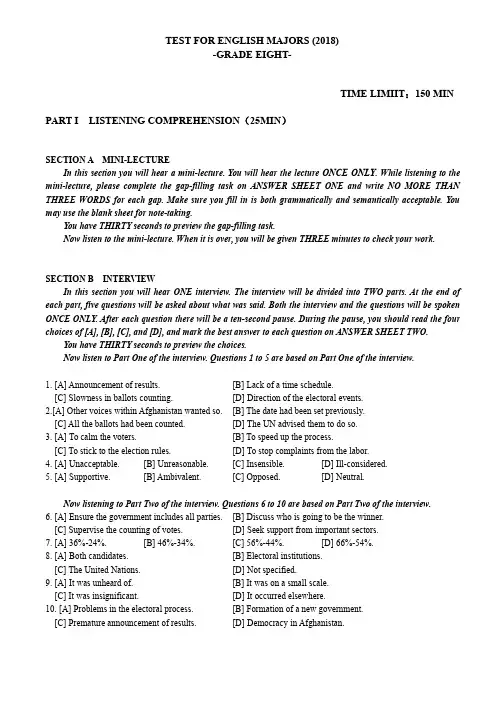
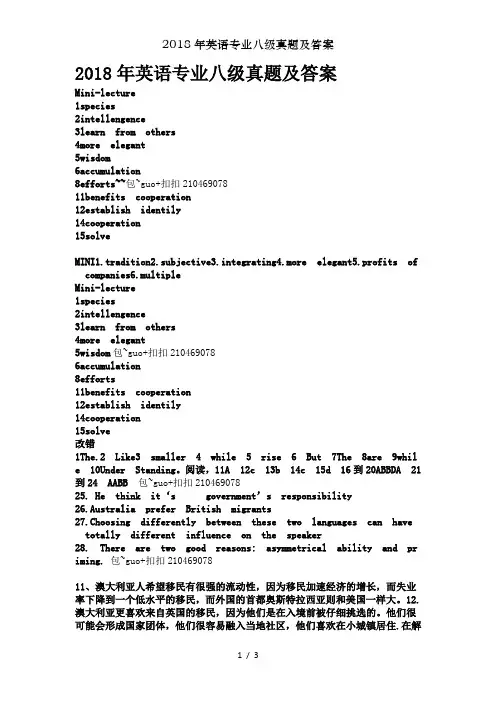
2018年英语专业八级真题及答案Mini-lecture1species2intellengence3learn from others4more elegant5wisdom6accumulation8efforts~~包~guo+扣扣21046907811benefits cooperation12establish identily14cooperation15solveMINI1.tradition2.subjective3.integrating4.more elegant5.profits of companies6.multipleMini-lecture1species2intellengence3learn from others4more elegant5wisdom包~guo+扣扣2104690786accumulation8efforts11benefits cooperation12establish identily14cooperation15solve改错1The.2 Like3 smaller 4 while 5 rise 6 But 7The 8are 9whil e 10Under Standing。
阅读,11A 12c 13b 14c 15d 16到20ABBDA 21到24 AABB 包~guo+扣扣21046907825. He think it‘s government’s responsibility26.Australia prefer British migrants27.Choosing differently between these two languages can havetotally different influence on the speaker28. There are two good reasons: asymmetrical ability and pr iming.包~guo+扣扣21046907811、澳大利亚人希望移民有很强的流动性,因为移民加速经济的增长,而失业率下降到一个低水平的移民,而外国的首都奥斯特拉西亚则和美国一样大。
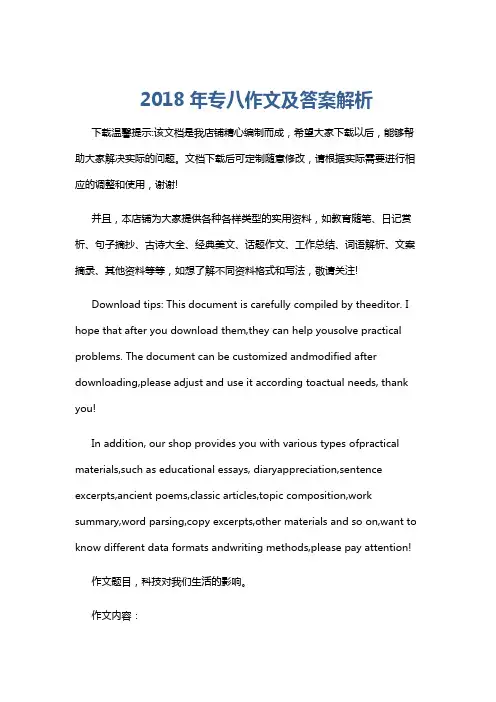
2018年专八作文及答案解析下载温馨提示:该文档是我店铺精心编制而成,希望大家下载以后,能够帮助大家解决实际的问题。
文档下载后可定制随意修改,请根据实际需要进行相应的调整和使用,谢谢!并且,本店铺为大家提供各种各样类型的实用资料,如教育随笔、日记赏析、句子摘抄、古诗大全、经典美文、话题作文、工作总结、词语解析、文案摘录、其他资料等等,如想了解不同资料格式和写法,敬请关注!Download tips: This document is carefully compiled by theeditor. I hope that after you download them,they can help yousolve practical problems. The document can be customized andmodified after downloading,please adjust and use it according toactual needs, thank you!In addition, our shop provides you with various types ofpractical materials,such as educational essays, diaryappreciation,sentence excerpts,ancient poems,classic articles,topic composition,work summary,word parsing,copy excerpts,other materials and so on,want to know different data formats andwriting methods,please pay attention!作文题目,科技对我们生活的影响。
作文内容:嘿,大家好呀!今天我想跟你们聊聊科技对我们生活的影响。
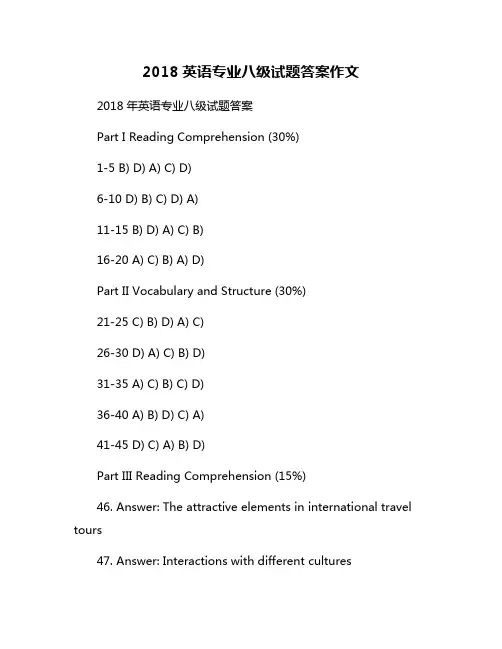
2018英语专业八级试题答案作文2018年英语专业八级试题答案Part I Reading Comprehension (30%)1-5 B) D) A) C) D)6-10 D) B) C) D) A)11-15 B) D) A) C) B)16-20 A) C) B) A) D)Part II Vocabulary and Structure (30%)21-25 C) B) D) A) C)26-30 D) A) C) B) D)31-35 A) C) B) C) D)36-40 A) B) D) C) A)41-45 D) C) A) B) D)Part III Reading Comprehension (15%)46. Answer: The attractive elements in international travel tours47. Answer: Interactions with different cultures48. Answer: It helps to cultivate an international perspective49. Answer: Local tour guides provide unique insights50. Answer: Travelers enjoy a more rewarding experience. Part IV Cloze (10%)51-55 C) A) D) B) C)56-60 A) D) B) C) A)Part V Error Correction (10%)61. as--->on the62. are--->were63. walk--->walking64. drinks--->drink65. has--->havePart VI Translation (5%)66. 美国爵士音乐在全球享有盛誉。
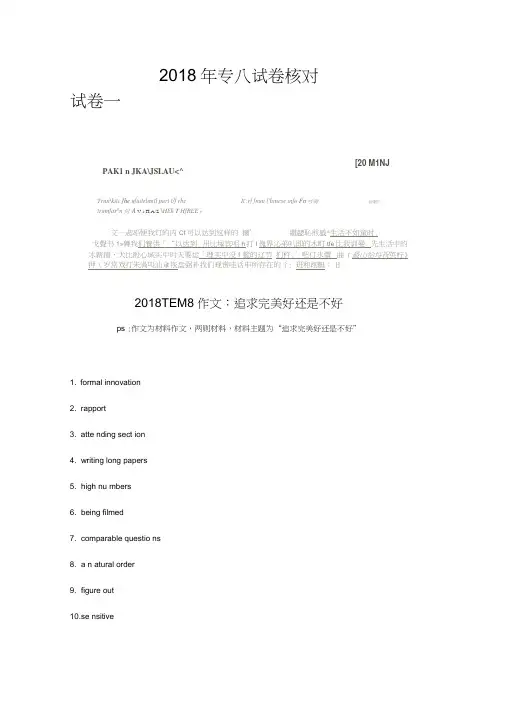
2018年专八试卷核对试卷一[20 M1NJPAK1 n JKA\JSI.AU<^Trun\kitc fhe ufuitrlimtl pari t/f rhe It'.rf fnun ('hinese info Fn吵询.何制尸trumfar^n 何A V.s H A/Z \HEk T HfREE «文―起昭便我灯的内Cf可以达到这样的擁’繼勰恥煎感*生活不如童时.戈聲书1»舞我们養供「“以迖到卅比塚宾咀h打I傀界沁弟叭即的木町tfe比我训曼先生活中的冰薪捕,犬比般心城实中时天要运「理实中没f 籃的辽节.扪杵.”吧仃氷價曲t最山恰埒祝英柠》押(岁常戏打朱渦叫汕ijt恢盘弼补找们现赏哇话申所存在的彳; 班和削艇: H2018TEM8 作文:追求完美好还是不好ps :作文为材料作文,两则材料,材料主题为“追求完美好还是不好”1. formal innovation2. rapport3. atte nding sect ion4. writing long papers5. high nu mbers6. being filmed7. comparable questio ns8. a n atural order9. figure out10. s e nsitiveIl.repeat ing12.i ntegrate into13.lo gical or n atural14. edit ing15. fu ndame ntal eleme nts听力:1. The initial letters of an easy-to-remember phrase2. [A] he's made up his mind to cha nge some of his passwords.3. in truders are patie nt eno ugh to compute.4. [D] The US takes up the leadi ng edge of tech no logy.5. [A] Why not to write dow n passwords on no tebooks6. [D] the developme nt of gen etic tests is out of people's expectati on.7. [C] misgivi ng.8. [A] improve self-discipline of the industry.9. [D] Alie nated.10. stre ngthe n its supervisi on with in limits.阅读:11. [C] they are lack ing in skills required by certa in jobs.12. [A] was a pion eer in the welfare state of Great Brita in.13. the frailties of huma n n ature.14. [D] appeara nee.15. [C] the pursuit of econo mic ben efit16. [A] was a famous tragic actor in his town.17. She was a girl of frail and weak body.18. the actresses were not available the n.19. [A] Domi nant.20. [D] was in agreeme nt with.21. [C] frow ns upo n22. [A] ben efited from the oppositi on party's bill.23. [D] Joh n McCain supports the bill due to his political sta ndpo int.24. deceitful阅读回答问题:25. Proposals should be directed to the journal office.26. The an alogy rests on the market economy 。
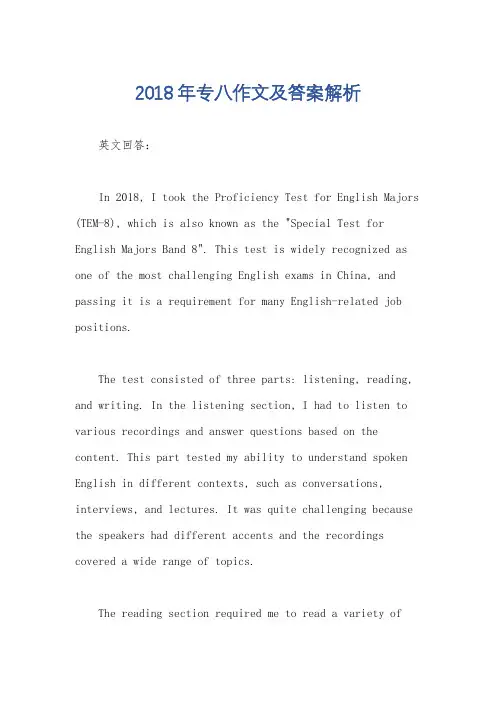
2018年专八作文及答案解析英文回答:In 2018, I took the Proficiency Test for English Majors (TEM-8), which is also known as the "Special Test for English Majors Band 8". This test is widely recognized as one of the most challenging English exams in China, and passing it is a requirement for many English-related job positions.The test consisted of three parts: listening, reading, and writing. In the listening section, I had to listen to various recordings and answer questions based on the content. This part tested my ability to understand spoken English in different contexts, such as conversations, interviews, and lectures. It was quite challenging because the speakers had different accents and the recordings covered a wide range of topics.The reading section required me to read a variety oftexts, including articles, essays, and reports, and answer questions based on the information provided. This parttested my reading comprehension skills and my ability to analyze and interpret written English. Some of the passages were quite lengthy and complex, so I had to read carefully and quickly to answer the questions within the given time limit.Finally, the writing section was perhaps the most challenging part of the test. I had to write an essay on a given topic within a limited time frame. This part testedmy ability to express my ideas clearly and coherently in written English. I had to organize my thoughts, provide supporting evidence, and present a well-structured argument. It required not only a good command of English grammar and vocabulary but also critical thinking and analytical skills.Overall, taking the TEM-8 exam was a demanding experience. It required a lot of preparation and practiceto improve my English skills and familiarize myself withthe test format. However, I believe that the effort was worth it, as passing this exam opens up many opportunitiesfor me in the future.中文回答:2018年,我参加了英语专业八级考试(TEM-8),这也被称为“英语专业八级考试”。
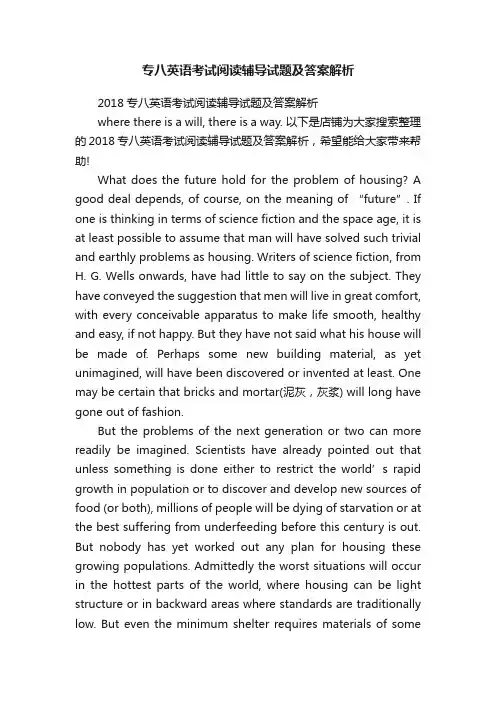
专八英语考试阅读辅导试题及答案解析2018专八英语考试阅读辅导试题及答案解析where there is a will, there is a way. 以下是店铺为大家搜索整理的2018专八英语考试阅读辅导试题及答案解析,希望能给大家带来帮助!What does the future hold for the problem of housing? A good deal depends, of course, on the meaning of “future”. If one is thinking in terms of science fiction and the space age, it is at least possible to assume that man will have solved such trivial and earthly problems as housing. Writers of science fiction, from H. G. Wells onwards, have had little to say on the subject. They have conveyed the suggestion that men will live in great comfort, with every conceivable apparatus to make life smooth, healthy and easy, if not happy. But they have not said what his house will be made of. Perhaps some new building material, as yet unimagined, will have been discovered or invented at least. One may be certain that bricks and mortar(泥灰,灰浆) will long have gone out of fashion.But the problems of the next generation or two can more readily be imagined. Scientists have already pointed out that unless something is done either to restrict the world’s rapid growth in population or to discover and develop new sources of food (or both), millions of people will be dying of starvation or at the best suffering from underfeeding before this century is out. But nobody has yet worked out any plan for housing these growing populations. Admittedly the worst situations will occur in the hottest parts of the world, where housing can be light structure or in backward areas where standards are traditionally low. But even the minimum shelter requires materials of somekind and in the teeming, bulging towns the low-standard “housing” of flattened petrol cans and dirty canvas is far more wasteful of ground space than can be tolerated.Since the war, Hong Kong has suffered the kind of crisis which is likely to arise in many other places during the next generation. Literally millions of refugees arrived to swell the already growing population and emergency steps had to be taken rapidly to prevent squalor(肮脏)and disease and the spread crime. The city is tackling the situation energetically and enormous blocks of tenements(贫民住宅)are rising at an astonishing aped. But Hong Kong is only one small part of what will certainly become a vast problem and not merely a housing problem, because when population grows at this rate there are accompanying problems of education, transport, hospital services, drainage, water supply and so on. Not every area may give the same resources as Hong Kong to draw upon and the search for quicker and cheaper methods of construction must never cease.1. What is the author’s opinion of housing problems in the first paragraph?A. They may be completely solved at sometime in the future.B. They are unimportant and easily dealt with.C. They will not be solved until a new building material has been discovered.D. They have been dealt with in specific detail in books describing the future.2. The writer is sure that in the distant future ___.A. bricks and mortar will be replaced by some other building material.B. a new building material will have been invented.C. bricks and mortar will not be used by people who want their house to be fashionable.D. a new way of using bricks and mortar will have been discovered.3. The writer believes that the biggest problem likely to confront the world before the end of the century ___.A. is difficult to foresee.B. will be how to feed the ever growing population.C. will be how to provide enough houses in the hottest parts of the world.D. is the question of finding enough ground space.4. When the writer says that the worst situations will occur in the hottest parts of the world or in backward areas, he is referring to the fact that in these parts ___.A. standards of building are low.B. only minimum shelter will be possible.C. there is not enough ground space.D. the population growth will be the greatest.5. Which of the following sentences best summarizes Paragraph 3?A. Hong Kong has faced a serious crisis caused by millions of refugees.B. Hong Kong has successfully dealt with the emergency caused by millions of refugees.C. Hong Kong’s crisis was not only a matter of housing but included a number of other problems of population growth.D. Many parts of the world may have to face the kind of problems encountered by Hong Kong and may find it much harder to deal with them.。
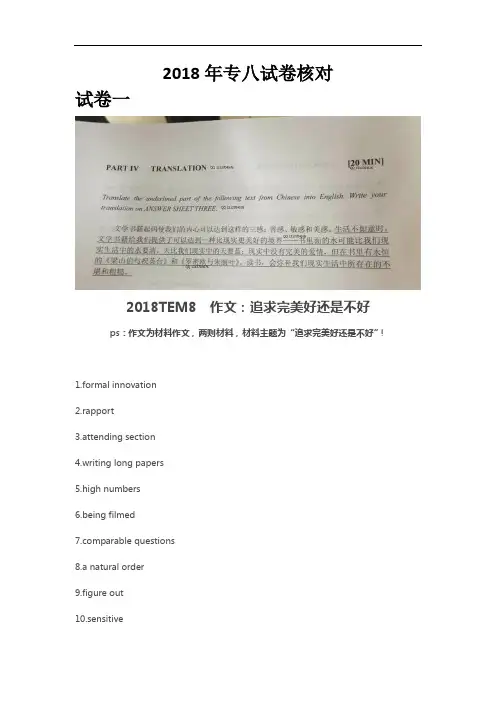
2018年专八试卷核对试卷一2018TEM8 作文:追求完美好还是不好ps:作文为材料作文,两则材料,材料主题为“追求完美好还是不好”!1.formal innovation2.rapport3.attending section4.writing long papers5.high numbers6.being filmedparable questions8.a natural order9.figure out10.sensitive11.repeating12.integrate into13.logical or natural14.editing15.fundamental elements听力:1. The initial letters of an easy-to-remember phrase2.[A] he's made up his mind to change some of his passwords.3. intruders are patient enough to compute.4.[D] The US takes up the leading edge of technology.5.[A] Why not to write down passwords on notebooks6.[D] the development of genetic tests is out of people's expectation.7.[C] misgiving.8.[A] improve self-discipline of the industry.9.[D] Alienated.10. strengthen its supervision within limits.阅读:11.[C] they are lacking in skills required by certain jobs.12.[A] was a pioneer in the welfare state of Great Britain.13. the frailties of human nature.14.[D] appearance.15.[C] the pursuit of economic benefit16.[A] was a famous tragic actor in his town.17. She was a girl of frail and weak body.18. the actresses were not available then.19.[A] Dominant.20.[D] was in agreement with.21.[C] frowns upon22.[A] benefited from the opposition party's bill.23.[D] John McCain supports the bill due to his political standpoint.24. deceitful阅读回答问题:25.Proposals should be directed to the journal office.26.The analogy rests on the market economy。
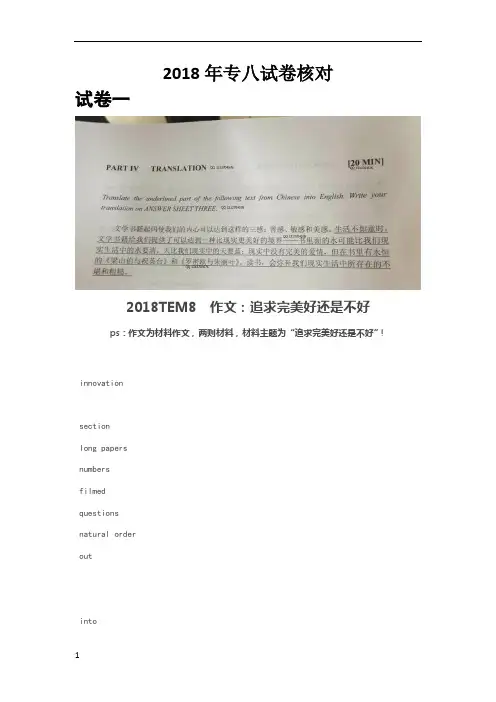
v1.0 可编辑可修改2018年专八试卷核对试卷一2018TEM8 作文:追求完美好还是不好ps:作文为材料作文,两则材料,材料主题为“追求完美好还是不好”!innovationsectionlong papersnumbersfilmedquestionsnatural orderoutintoor naturalelements听力:1.The initial letters of an easy-to-remember phrase2.[A] he's made up his mind to change some of his passwords.3. intruders are patient enough to compute.4.[D] The US takes up the leading edge of technology.5.[A] Why not to write down passwords on notebooks6.[D] the development of genetic tests is out of people's expectation.7.[C] misgiving.8.[A] improve self-discipline of the industry.9.[D] Alienated.10. strengthen its supervision within limits.阅读:11.[C] they are lacking in skills required by certain jobs.12.[A] was a pioneer in the welfare state of Great Britain.13. the frailties of human nature.14.[D] appearance.15.[C] the pursuit of economic benefit16.[A] was a famous tragic actor in his town.17. She was a girl of frail and weak body.18. the actresses were not available then.19.[A] Dominant.20.[D] was in agreement with.21.[C] frowns upon22.[A] benefited from the opposition party's bill.23.[D] John McCain supports the bill due to his political standpoint.24. deceitful阅读回答问题:should be directed to the journal office.analogy rests on the market economy。
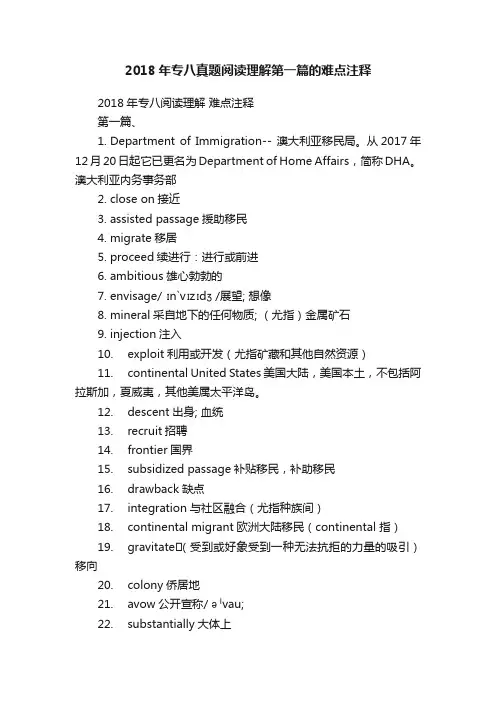
2018年专八真题阅读理解第一篇的难点注释2018年专八阅读理解难点注释第一篇、1.Department of Immigration-- 澳大利亚移民局。
从2017年12月20日起它已更名为Department of Home Affairs,简称DHA。
澳大利亚内务事务部2.close on接近3.assisted passage援助移民4.migrate移居5.proceed续进行:进行或前进6.ambitious雄心勃勃的7.envisage/ ɪn`vɪzɪdʒ /展望; 想像8.mineral采自地下的任何物质; (尤指)金属矿石9.injection注入10.exploit利用或开发(尤指矿藏和其他自然资源)11.continental United States美国大陆,美国本土,不包括阿拉斯加,夏威夷,其他美属太平洋岛。
12.descent出身; 血统13.recruit招聘14.frontier国界15.subsidized passage补贴移民,补助移民16.drawback缺点17.integration与社区融合(尤指种族间)18.continental migrant欧洲大陆移民(continental 指)19.gravitate•(受到或好象受到一种无法抗拒的力量的吸引)移向20.colony侨居地21.avow公开宣称/ əˈvau;22.substantially大体上23.homogeneous/ ˏhɔməˈdʒiːnɪəs/同质化社会24.by and large大体上; 基本上25.selective挑挑拣拣的26.cause of concern令人担忧的问题27.country of origin原籍国,出生国28.return fare返程票29.outside lavatory室外卫生间30.crudity粗鲁 /'kruːdɪtɪ/31.stark荒凉的; 光秃秃的32.council housing-- (美国称为 public housing•)33.houses or flats owned by the government for which the rent is lower than homes that are privately owned公租房34.National Health scheme国民医疗服务制度,英国的医保35.housebound困居家中的36.inadequate不充分的37.outlying偏僻的, 边远的38.correspondence通信,信件往来39.Housing Commission home 澳大利亚联邦住房委员会的廉租房40.wage packet--薪金或工资(美国用法:paycheck)the money that you earn, especially when it is given to you in notes and coins in an envelope41.qualification--(获得的)学位, 文凭, 证书, 执照等42.anything but根本不,决不43.rosy picture美好的景象44.Aussie澳洲人 /'ɔ:si:; 'ɔzi/45.blow one's own trumpet 自吹自擂46.go down heart-break alley 步入伤心路47.expansive开放的,慷慨的。

TEST FOR ENGLISH MAJORS(2018)-GRADE EIGHT-TIME LIMIIT:150MIN PART I LISTENING COMPREHENSION(25MIN)SECTION A MINI-LECTUREIn this section you will hear a mini-lecture.You will hear the lecture ONCE ONLY.While listening to the mini-lecture,please complete the gap-filling task on ANSWER SHEET ONE and write NO MORE THAN THREE WORDS for each gap.Make sure you fill in is both grammatically and semantically acceptable.You may use the blank sheet for note-taking.You have THIRTY seconds to preview the gap-filling task.Now listen to the mini-lecture.When it is over,you will be given THREE minutes to check your work.SECTION B INTERVIEWIn this section you will hear ONE interview.The interview will be divided into TWO parts.At the end of each part,five questions will be asked about what was said.Both the interview and the questions will be spoken ONCE ONLY.After each question there will be a ten-second pause.During the pause,you should read the four choices of[A],[B],[C],and[D],and mark the best answer to each question on ANSWER SHEET TWO.You have THIRTY seconds to preview the choices.Now listen to Part One of the interview.Questions1to5are based on Part One of the interview.1.[A]Announcement of results.[B]Lack of a time schedule.[C]Slowness in ballots counting.[D]Direction of the electoral events.2.[A]Other voices within Afghanistan wanted so.[B]The date had been set previously.[C]All the ballots had been counted.[D]The UN advised them to do so.3.[A]To calm the voters.[B]To speed up the process.[C]To stick to the election rules.[D]To stop complaints from the labor.4.[A]Unacceptable.[B]Unreasonable.[C]Insensible.[D]Ill-considered.5.[A]Supportive.[B]Ambivalent.[C]Opposed.[D]Neutral.Now listening to Part Two of the interview.Questions6to10are based on Part Two of the interview.6.[A]Ensure the government includes all parties.[B]Discuss who is going to be the winner.[C]Supervise the counting of votes.[D]Seek support from important sectors.7.[A]36%-24%.[B]46%-34%.[C]56%-44%.[D]66%-54%.8.[A]Both candidates.[B]Electoral institutions.[C]The United Nations.[D]Not specified.9.[A]It was unheard of.[B]It was on a small scale.[C]It was insignificant.[D]It occurred elsewhere.10.[A]Problems in the electoral process.[B]Formation of a new government.[C]Premature announcement of results.[D]Democracy in Afghanistan.PARTⅡREADING COMPREHENSION(45MIN)SECTION A MULTIPLE CHOICE QUESTIONSIn this section there are three passages followed by fourteen multiple choice questions.For each multiple choice question,there are four suggested answers marked[A],[B],[C],and[D].Choose the one that you think is the best answer and mark your answer on ANSWER SHEET TWO.PASSAGE ONE(1)“Britain’s best export,”I was told by the Department of Immigration in Canberra,“is people.”Close on100,000people have applied for assisted passages in the first five months of the year,and half of these are eventually expected to migrate to Australia.(2)The Australian are delighted.They are keenly ware that without a strong flow of immigrants into the workforce the development of the Australian economy is unlikely to proceed at the ambitious pace currently envisaged.The new mineral discoveries promise a splendid future,and the injection of huge amounts of American and British capital should help to ensure that they are properly exploited,but with unemployment in Australia down to less than1.3per cent,the government is understandably anxious to attract more skilled labor.(3)Australia is roughly the same size as the continental United States,but has only twelve million inhabitants.Migration has accounted for half the population increase in the last four years,and has contributed greatly to the country’s impressive economic development.Britain has always been the principal source–ninety per cent of Australians are of British descent,and Britain has provided one million migrants since the Second World War.(4)Australia has also given great attention to recruiting people elsewhere.Australians decided they had an excellent potential source of applicants among the so-called“guest workers”who have crossed their own frontiers to work in other arts of Europe.There were estimated to be more than four million of them,and a large number were offered subsidized passages and guaranteed jobs in Australia.Italy has for some years been the second biggest source of migrants,and the Australians have also managed to attract a large number of Greeks and Germans.(5)One drawback with them,so far as the Australians are concerned,is that integration tends to be more difficult.Unlike the British,continental migrants have to struggle with an unfamiliar language and new customs.Many naturally gravitate towards the Italian or Greek communities which have grown up in cities such as Sydney and Melbourne.These colonies have their own newspapers,their own shops,and their own clubs.Their inhabitants are not Australians,but Europeans.(6)The government’s avowed aim,however,is to maintain“a substantially homogeneous society into which newcomers,from whatever sources,will merge themselves”.By and large,therefore,Australia still prefers British migrants,and tends to be rather less selective in their case than it is with others.(7)A far bigger cause of concerns than the growth of national groups,however,is the increasing number of migrants who return to their countries of origin.One reason is that people nowadays tend to be more mobile,and that it is easier than in the past to save the return fare,but economic conditions also have something to do with it.A slower rate of growth invariably produces discontent–and if this coincides with greater prosperity in Europe,a lot of people tend to feel that perhaps they were wrong to come here after all.(8)Several surveys have been conducted recently into the reasons why people go home.One noted that “flies,dirt,and outside lavatories”were on the list of complaints from British immigrants,and added that many people also complained about“the crudity,bad manners,and unfriendliness of the Australians”.Another survey gave climate conditions,homesickness,and“the stark appearance of the Australian countryside”as the main reasons for leaving.(9)Most British migrants miss council housing the National Health scheme,and their relatives and former neighbor.Loneliness is a big factor,especially among housewives.The men soon make new friends at work,but wives tend to find it much harder to get used to a different way of life.Many are housebound because of inadequate public transport in most outlying suburbs,and regular correspondence with their old friends at home only serves to increase their discontent.One housewife was quoted recently as saying:“I even find I miss the people I used to hate at home.”(10)Rent are high,and there are long waiting lists for Housing Commission homes.Sickness can be an expensive business and the climate can be unexpectedly rough.The gap between Australian and British wage packets is no longer big,and people are generally expected to work harder here than they do at home. Professional men over forty often have difficulty in finding a decent job.Above all,perhaps,skilled immigrants often finds a considerable reluctance to accept their qualifications.(11)According to the journal Australian Manufacturer,the attitude of many employers and fellow workers is anything but friendly.“We Australians,”it stated in a recent issue,“are just too fond of painting the rosy picture of the big,warm-hearted Aussie.As a matter of fact,we are so busy blowing our own trumpets that we have not not time to be warm-hearted and considerate.Go down‘heart-break alley’among some of the migrants and find out just how expansive the Aussie is to his immigrants.”11.The Australians want a strong flow of immigrants because.[A]Immigrants speed up economic expansion[B]unemployment is down to a low figure[C]immigrants attract foreign capital[D]Australia is as large as the United States12.Australia prefers immigrants from Britain because.[A]they are selected carefully before entry[B]they are likely to form national groups[C]they easily merge into local communities[D]they are fond of living in small towns13.In explaining why some migrants return to Europe the author.[A]stresses their economic motives[B]emphasizes the variety of their motives[C]stresses loneliness and homesickness[D]emphasizes the difficulties of men over forty14.which of the following words is used literally,not metaphorically?[A]“flow”(Para.2).[B]“injection”(Para.2).[C]“gravitate”(Para.5).[D]“selective”(Para.6).15.Para.11pictures the Australians as.[A]unsympathetic[B]ungenerous[C]undemonstrative[D]unreliablePASSAGE TWO(1)Some of the advantages of bilingualism include better performance at tasks involving“executive function”(which involves the brain’s ability to plan and prioritize),better defense against dementia in old age and—the obvious—the ability to speak a second language.One purported advantage was not mentioned, though.Many multilinguals report different personalities,or even different worldviews,when they speak their different languages.(2)It’s an exciting notion,the idea that one’s very self could be broadened by the mastery of two or morelanguages.In obvious ways(exposure to new friends,literature and so forth)the self really is broadened.Yet it is different to claim—as many people do—to have a different personality when using a different language.A former Economist colleague,for example,reported being ruder in Hebrew than in English.So what is going on here?(3)Benjamin Lee Whorf,an American linguist who died in1941,held that each language encodes a worldview that significantly influences its speakers.Often called“Whorfianism”,this idea has its sceptics,but there are still good reasons to believe language shapes thought.(4)This influence is not necessarily linked to the vocabulary or grammar of a second language. Significantly,most people are not symmetrically bilingual.Many have learned one language at home from parents,and another later in life,usually at school.So bilinguals usually have different strengths and weaknesses in their different languages—and they are not always best in their first language.For example, when tested in a foreign language,people are less likely to fall into a cognitive trap(answering a test question with an obvious-seeming but wrong answer)than when tested in their native language.In part this is because working in a second language slows down the thinking.No wonder people feel different when speaking them. And no wonder they feel looser,more spontaneous,perhaps more assertive or funnier or blunter,in the language they were reared in from childhood.(5)What of“crib”bilinguals,raised in two languages?Even they do not usually have perfectly symmetrical competence in their two languages.But even for a speaker whose two languages are very nearly the same in ability,there is another big reason that person will feel different in the two languages.This is because there is an important distinction between bilingualism and biculturalism.(6)Many bilinguals are not bicultural.But some are.And of those bicultural bilinguals,we should be little surprised that they feel different in their two languages.Experiments in psychology have shown the power of“priming”—small unnoticed factors that can affect behavior in big ways.Asking people to tell a happy story,for example,will put them in a better mood.The choice between two languages is a huge prime. Speaking Spanish rather than English,for a bilingual and bicultural Puerto Rican in New York,might conjure feelings of family and home.Switching to English might prime the same person to think of school and work.(7)So there are two very good reasons(asymmetrical ability,and priming)that make people feel different speaking their different languages.We are still left with a third kind of argument,though.An economist recently interviewed here at Prospero,Athanasia Chalari,said for example that: Greeks are very loud and they interrupt each other very often.The reason for that is the Greek grammar and syntax.When Greeks talk they begin their sentences with verbs and the form of the verb includes a lot of information so you already know what they are talking about after the first word and can interrupt more easily.(8)Is there something intrinsic to the Greek language that encourages Greeks to interrupt?People seem to enjoy telling tales about their languages’inherent properties,and how they influence their speakers.A group of French intellectual worthies once proposed,rather self-flatteringly,that French be the sole legal language of the EU,because of its supposedly unmatchable rigor and precision.Some Germans believe that frequently putting the verb at the end of a sentence makes the language especially logical.But language myths are not always self-flattering:many speakers think their languages are unusually illogical or difficult—witness the plethora of books along the lines of“Only in English do you park on a driveway and drive on a parkway; English must be the craziest language in the world!”We also see some unsurprising overlap with national stereotypes and self-stereotypes:French,rigorous;German,logical;English,playful.Of course.(9)In this case,Ms Chalari,a scholar,at least proposed a specific and plausible line of causation from grammar to personality:in Greek,the verb comes first,and it carries a lot of information,hence easy interrupting.The problem is that many unrelated languages all around the world put the verb at the beginning of sentences.Many languages all around the world are heavily inflected,encoding lots of information in verbs. It would be a striking finding if all of these unrelated languages had speakers more prone to interrupting eachother.Welsh,for example,is also both verb-first and about as heavily inflected as Greek,but the Welsh are not known as pushy conversationalists.16.According to the author,which of the following advantages of bilingualism is commonly accepted?[A]Personality improvement.[B]Better task performance.[C]Change of worldviews.[D]Avoidance of old-age disease.17.According to the passage,that language influences thought may be related to.[A]the vocabulary of a second language[B]the grammar of a second language[C]the improved test performance in a second language[D]the slowdown of thinking in a second language18.What is the author’s response to the question at the beginning of Para.8?[A]It’s just one of the popular tales of national stereotypes.[B]Some properties inherent can make a language logical.[C]German and French are good examples of Whorfianism.[D]There is adequate evidence to support a positive answer.19.Which of the following statements concerning Para.9is correct?[A]Ms.Chalari’s theory about the Greek language is well grounded.[B]Speakers of many other languages are also prone to interrupting.[C]Grammar is unnecessarily a condition for change in personality.[D]Many unrelated languages don’t have the same features as Greek.20.In discussing the issue,the author’s attitude is.[A]satirical[B]objective[C]critical[D]ambivalentPASSAGE THREE(1)Once across the river and into the wholesale district,she glanced about her for some likely door at which to apply.As she contemplated the wide windows and imposing signs,she became conscious of being gazed upon and understood for what she was—a wage-seeker.She had never done this thing before and lacked courage.To avoid conspicuity and a certain indefinable shame she felt at being caught spying about for some place where she might apply for a position,she quickened her steps and assumed an air of indifference supposedly common to one upon an errand.In this way she passed many manufacturing and wholesale houses without once glancing in.At last,after several blocks of walking,she felt that this would not do,and began to look about again,though without relaxing her pace.A little way on she saw a great door which,for some reason attracted her attention.It was ornamented by a small brass sign,and seemed to be the entrance to a vast hive of six or seven floors.“Perhaps,”she thought,“they may want someone,”and crossed over to enter, screwing up her courage as she went.When she came within a score of feet of the desired goal,she observed a young gentleman in a grey clerk suit,fumbling his watch-chain and looking out.That he had anything to do with the concern she could not tell,but because he happened to be looking in her direction,her weakening heart misgave her and she hurried by,too overcome with shame to enter in.After several blocks of walking,in which the uproar of the streets and the novelty of the situation had time to wear away the effect of her first defeat,she again looked about.Over the way stood a great six-story structure labeled“Storm and King,”which she viewed with rising hope.It was a wholesale dry goods concern and employed women.She could see them moving about now and then upon the upper floors.This place she decided to enter,no matter what. She crossed over and walked directly toward the entrance.As she did so two men came out and paused in the door.A telegraph messenger in blue dashed past her and up the few steps which graced the entrance anddisappeared.Several pedestrians out of the hurrying throng which filled the sidewalks passed about her as she paused,hesitating.She looked helplessly around and then,seeing herself observed,retreated.It was too difficult a task.She could not go past them.(2)So severe a defeat told sadly upon her nerves.She could scarcely understand her weakness and yet she could not think of gazing inquiringly about upon the surrounding scene.Her feet carried her mechanically forward,every foot of her progress being a satisfactory portion of a flight which she gladly made.Block after block passed by.Upon streetlamps at the various corners she read names such as Madison,Monroe,La Salle, Clark,Dearborn;and still she went,her feet beginning to tire upon the broad stone flagging.She was pleased in part that the streets were bright and clean.The morning sun shining down with steadily increasing warmth made the shady side of the streets pleasantly cool.She looked at the blue sky overhead with more realization of its charm than had ever come to her before.(3)Her cowardice began to trouble her in a way.She turned back along the street she had come, resolving to hunt up Storm and King and enter.On the way she encountered a great wholesale shoe company, through the broad plate windows of which she saw an enclosed executive department,hidden by frosted glass. Without this enclosure,but just within the street entrance,sat a grey-haired gentleman at a small table,with a large open ledger of some kind before him.She walked by this institution several times hesitating,but finding herself unobserved she eventually gathered sufficient courage to falter past the screen door and stood humble waiting.(4)“Well,young lady,”observed the old gentleman,looking at her somewhat kindly—“what is it you wish?”(5)“I am,that is,do you—I mean,do you need any help?”she stammered.(6)“Not just at present,”he answered smiling.“Not just at e in some time next week. Occasionally we need some one.”(7)She received the answer in silence and backed awkwardly out.The pleasant nature of her reception rather astonished her.She had expected that it would be more difficult,that something cold and harsh would be said—she knew not what.That she had not been put to shame and made to feel her unfortunate position seemed remarkable.She did not realize that it was just this which made her experience easy,but the result was the same.She felt greatly relieved.(8)Somewhat encouraged,she ventured into another large structure.It was a clothing company,and more people were in evidence.(9)An office boy approached her.(10)“Who is it you wish to see?”he asked.(11)“I want to see the manager,”she returned.(12)He ran away and spoke to one of a group of three men who were conferring together.One broke off an came towards her.(13)“Well?”he said,coldly.The greeting drove all courage from her at once.(14)“Do you need any help?”she stammered.(15)“No,”he replied abruptly and turned upon his heel.(16)She went foolishly out,the office boy deferentially swinging the door for her,and gladly sank into the obscuring crowd.It was a severe set-back to her recently pleased mental state.21.She quickened her steps because she.[A]was afraid of being seen as a stranger[B]was in a hurry to leave the district[C]wanted to look like someone working there[D]wanted to apply at more factories that day。
2018 年英语专业八级考试真题答案及解析PART I LISTENING COMPREHENSIONSECTION A MINI-LECTURE 1. our species/ humans/ human beings 2. (their) intelligence 3. learn from others 4. repeat 5. others'wisdom/ other people's wisdom 6. accumulate 7. an evolutionary dilemma 8, watching others/ watching other people9. systems of communication 10. knowledge and wisdom 11. benefits of cooperation 12. established ofidentities 13. isolation 14.con皿unication 15. different languagesMINI-LECTURE 听力原文Language and Humanity语言和人类Good morning, everyone. In today's lecture, we're going to discuss the relationship between language and humanity. As we all know, language is very powerful. It allows you to put a thought from your mind directly in someone else's mind. Languages are like genes ta脰ng, getting things they want. And you just imagine the sense of wonder in a baby when it first discovers that, merely by uttering a sound, it can get objects to move across a room as ifby magic, and maybe even into its mouth. Now we need to explain how and why this remarkable trait, you know, h皿ian's ability to do things with language, has evolved, and why did this trait evolve only in our species? In order to get an answer to the question, we have to go to tool use in the chimpanzees. Chimpanzees can use tools, and we take that phenomenon as a sign of their intelligence. But if they really were intelligent, why would they crack open nuts with a rock? Why wouldn't they just go to a shop and buy a bag of nuts that somebody else had already cracked open for them? Why not? I mean, that's what we do.大家早上好。
专八阅读理解练习附详解2018专八阅读理解练习附详解Short accounts make long friends.以下是店铺为大家搜索整理的2018专八阅读理解练习附详解,希望能给大家带来帮助!Exploration of the TitanicAfter resting on the ocean floor, split asunder and rusting, for nearly three-quarters of a century, a great ship seemed to cone alive again. The saga of the White Star liner Titanic, which struck an iceberg and sank on its maiden voyage in 1912, carrying more than 1,500 passengers to their death, has been celebrated in print and on film, in poetry and song. But last week what had been legendary suddenly became real. As they viewed videotapes and photographs of the sunken leviathan, millions of people around the world could sense her mass, her eerie quiet and the ruined splendor of a lost age.Watching on television, they vicariously joined the undersea craft Alvin and Jason Jr. (J.J.) as they toured the wreckage of the luxury liner, wandering across the decks past corroded bollards, peering into the officer’s quarters and through rust-curtained portholes. Views of the railings where doomed passengers and crewmembers stood evoked images of the moonless night 74years ago when the great ship slipped beneath the waves.The two-minute videotape and nine photographs, all in color and shot 12,500ft.under the North Atlantic, were a tiny sample of 60 hours of video and 60,000 stills garnered during the twelve-day exploration. They are released at a Washington press conference conducted by Marine Geologist Robert Ballard, 44, who led the teams from the Wood Hole Oceanographic Institution that found the Titanic last September and revisited itthis July.Recounting the highlights of what has already become the most celebrated feat of underwater exploration, Ballard revealed some startling new information. His deep-diving craft failed to find the 300-ft. gash that, according to legend, was torn in the Titanic’s hull when the ship plowed into the iceberg. Instead, he suggested, the collision had buckled the ship’s plates, all owing water to pour in. He also brought back evidence that the ship broke apart not when she hit bottom, as he had thought when viewing the first Titanic images last September, but as she sank: the stern, which settled on the bottom almost 1,800ft. from the bow, had swiveled 180 on its way down.1. What is the best title for this passage?[A] New Information about the Sunken Ship.[B] Exploration of the Titanic.[C] To watch the Videotape.[D] To explore the Titanic with High T ech.2. How did the viewers feel when watching the videotape?[A] They felt rather sad, and felt they themselves took part in the exploration.[B] They felt keenly for it.[C] They felt rather bad about it.[D] They felt out of spirits.3. When did the great ship sink?[A] In 1912.[B] She sank in its maiden voyage in 1912.[C] She sank in its second voyage in 1912.[D] She sank in its first voyage in 1912.4. What did Robert reveal at a press conference?[A] He revealed some startling information.[B] He said nothing.[C] He complained the exploration was very hard.[D] He revealed the success of their work.答案详解:1.D. 用高技术探测泰坦尼克号。
专业英语八级真题2018年(总分:99.92,做题时间:90分钟)一、PART Ⅰ LISTENING COMPREHENSION(总题数:0,分数:0.00)二、SECTION A MINI-LECTURE(总题数:1,分数:15.00)Language and HumanityLanguage is powerful and it can help us do or get things as we wish. Language as a born trait● Language has evolved only in 1 .● Comparison between chimpanzees and human beings:- Chimpanzees- use of tools: once seen as a sign of 2- inability to 3- tendency to 4- Human beings- able to improve and build on 5- able to 6 ideasLanguage and social learning● Problem of social learning: 7- Cause:- stealing others" ideas by 8- Solution:- 9 developed to share ideas● Results- 10 made available to every individual- language as social technology to enhance 11Language and the modern world● Existence of many different languages has led to- separation of cooperative groups- 12- knowledge protection- slow flow of ideas and tendency toward 13● Globalization needs 14 .● 15 hinder cooperation.Solution: one world with one languageLanguage and HumanityLanguage is powerful and it can help us do or get things as we wish. Language as a born trait● Language has evolved only in 1 .● Comparison between chimpanzees and human beings:- Chimpanzees- use of tools: once seen as a sign of 2- inability to 3- tendency to 4- Human beings- able to improve and build on 5- able to 6 ideasLanguage and social learning● Problem of social learning: 7- Cause:- stealing others" ideas by 8- Solution:- 9 developed to share ideas● Results- 10 made available to every individual- language as social technology to enhance 11Language and the modern world● Existence of many different languages has led to- separation of cooperative groups- 12- knowledge protection- slow flow of ideas and tendency toward 13● Globalization needs 14 .● 15 hinder cooperation.Solution: one world with one language(分数:15.00)解析:human beings/humans [听力原文]Language and humanityGood morning, everyone. In today"s lecture, we"ll going to discuss the relationship between language and humanity. As we all know, language is very powerful and allows you to put a thought from your mind directly in someone else"s mind. Languages are like genes" talking, getting things they want. And you just imagine the sense of wonder in a baby when it first discovers that, merely by uttering a sound, it can get objects to move across the room, as if by magic, and maybe even into its mouth. Now we need to explain how and why this remarkable trait, you know, human"s ability to do things with language has evolved, and why did this trait evolve only in our species.In order to get answer to the question, we have to go to tool-use in the Chimpanzees. Chimpanzees can use tools, and we take that phenomenon as a sign of their intelligence. But if they really were intelligent, why would they crack open nuts with a rock? Why wouldn"t they just go to a shop and buy a bag of nuts that somebody else had already cracked open for them? Why not, I mean, that"s what we do. The reason that Chimpanzees don"t do that is that they lack what"s psychologist and anthropologist call "social learning". That is, they seem to lack the ability to learn from others by copying or imitating or simply watching. As a result, they can"t improve on others" ideas, learn from others" mistakes, or even benefit from others" wisdom. And so they just do the same thing over and over and over again. In fact, we could go away for a million years and come back and these Chimpanzees would be doing the same thing with the same rocks to crack open the nuts. Ok, so what this tells us is that, contrary to the old saying "monkey see, monkey do", the surprise really is that all of the other animals really cannot do that—at least not very much. But by comparison, we humans can learn. We can learn by watching other people and copying or imitating what they can do. We can then choose, from among a range of options available the best one. We can benefit from others" ideas. We can build on their wisdom. And as a result, our ideas do accumulate, and our technology progresses. In this cumulative cultural adaptation, as anthropologists called as "accumulation of ideas", is responsible for everything around you in your bustling and teeming everyday life. I mean the world has changed out of all proportion towhat we would recognize even 1,000 or 2,000 years ago. And all of this is because of cumulative cultural adaptation. For instance, the chairs you are sitting in today, the lights in this lecture hall, my microphone, the ipads, and the smart phones that you carry around with you—all are a result of cumulative cultural adaptation. But our acquisition of social learning would create an evolutionary dilemma. And the solution to the dilemma, is fair to say, will determine not only the future course of our psychology, but the future course of the entire world. And most importantly for this, it will tell us why we have language. And the reason that the dilemma arose is, it turns out that the social learning is visual theft. What I mean is if I can learn by watching you, I can steal your best ideas, and I can benefit from your efforts without having to put in the same time and energy that you did into developing them. Social learning really is visual theft. And in any species that acquired it, it would encourage you to hide your best ideas, lest somebody steal them from you. And so some time around 200,000 years ago, our species confronted this crisis. And we chose to develop the systems of communication that would allow us to share ideas and to cooperate amongst others. Choosing this option would mean that a vastly greater fund of knowledge and wisdom would become available to any one individual than would ever arise from within an individual family or individual person on their own. Well, language is the result. Language evolved to solve the crisis of visual theft. Language is a piece of social technology for enhancing the benefits of cooperation —for reaching agreements, for striking deals and for coordinating our activities. And you can see that, in a developing society that was beginning to acquire language, not having language would be like a bird without wings.As I said at the beginning, language really is the voice of our genes. But as we spread out around the world, we developed thousands of different languages. Currently, there are about seven or eight thousand different languages spoken on the earth. And then another problem occurred, it seems that we use our language, not just to cooperate, but to draw rings around our cooperative groups and to establish identities, and perhaps to protect our knowledge and wisdom and skills from being stolen from outside. And we know this because when we study different language groups and associate them with their cultures, we see that different languages slow the flow of ideas between groups. Ok, this tendency we have, the seemingly natural tendency we have, goes towards isolation, towards keeping everything to ourselves, while our modern world, is communicating with itself and with each other more than it has at any time in its past. And that communication, that connectivity around the world, that globalization now raises a burden. Because these different languages impose barrier, as we"ve just seen, to the transfer of goods and ideas and technologies and wisdom. And they impose barrier to cooperation. What will be the solution in a world in which we want to promote cooperation and exchange, and in a world that might be dependent more than ever before on cooperation, to maintain and enhance our levels of prosperity? I think it might be inevitable that we have to confront the idea that our destiny is to be one world with one language. What do you think of the solution?Ok, in today"s lecture, I have presented to you how language shapes our humanity, what kind of dilemma social learning has created, and the possible solutions to the dilemma. In our next lecture, I"m going to talk about lingua franca and its functions.[解析] 根据原文“... and why did this trait evolve only in our species”可知,这里指的是人类。
PartⅠLISTENING COMPREHENSIONSECTION A MINI-LECTURE1. humans / human species2. intelligence3. learn from others4. repeat5. others’ wisdom/other people’s wisdom6. accumulate7.an evolutionary dilemma8.watching others/watching other people9. systems of communication10. knowledge and wisdom11. benefits of cooperation12. identity establishment/establishment of identities13. isolation14. communication15. different languagesSECTION B INTERVIEW1. Which aspect of the election event is the interviewee most concerned about?答案:D. Direction of the electoral events.2. Why was the announcement made yesterday, according to the interviewee?答案:B. The date had been set previously.3. According to the BBC interviewer, why did the electoral institutions want to prepare the ground?答案:D. To stop complaints from the loser.4. What did the interviewee think of the BBC’s reason of preparing the ground?答案:D. Ill considered.5. What is the interviewee’s attitude towards establishing a parallel presidency?答案:C. Opposed.6. What does the interviewee think both candidates need to do?答案:D. Seek support from important sectors.7. What was the margin of victory at the time of the interview?答案:C. 56%-44%.8. Who should be responsible for dealing with the fraud in the election?答案:B. Electoral institutions.9. What does the interviewee think of the problem in the Afghan election?答案:D. It occurred elsewhere.10. What is the interview mainly about?答案:A. Problems in the electoral process.Part II READING COMPREHENSIONSECTION A MULTIPLE-CHOICE QUESTIONSPASSAGE ONE11. The Australians want a strong flow of immigrants because .答案:A. immigrants speed up economic expansion12. Australia prefers immigrants from Britain because .答案:C. they easily merge into local communities13. In explaining why some migrants return to Europe the author答案:B. emphasizes the variety of their motives14. Which of the following words is used literally, not metaphorically?答案:D. “selective” (Para. 6).15. Para. 11 pictures the Australians as .答案:B. ungenerous.PASSAGE TWO16. According to the author, which of the following advantages of bilingualism is commonly accepted?答案:B. Better task performance.17. According to the passage, that language influences thought may be related to .答案:D. the slowdown of thinking in a second language18. What is the author’s response to the question at the beginning of Para. 8?答案:A. It’s just one of the popular tales of national stereotypes.19. Which of the following statements concerning Para. 9 is correct?答案:C. Grammar is unnecessarily a condition for change in personality.20. In discussing the issue, the author’s attitude is .答案:B. objectivePASSAGE THREE21. She quickened her steps because she .答案:C. wanted to look like someone working there22. Why didn’t she enter Storm and Ki ng the first time?答案:A. She was too timid to enter the building.23. What does “every foot of her progress being a satisfactory portion ofa flight which she gladly made” mean according to the context (Para. 2)?答案:D. She just wanted to leave the place.24. Why did she feel greatly relieved (Para. 7)?答案:B. She was kindly received by the clerk.SECTION B SHORT-ANSWER QUESTIONSPASSAGE ONE25. What do “promise” and “should” in Para. 2 imply about the author’s vision of Australia’s economy?答案:Australian economy cannot achieve fast development as assumed without immigrants.26. Explain the meaning of “the growth of national groups” according to the context (Para. 7).答案:The increase of groups formed by immigrants from different sources.PASSAGE TWO27. Explain the meaning of “The choice between two languages is a huge prime.” according to the context (Para. 6).答案:Different languages trigger different related memories and feelings.28. What reasons does the author give to explain why people feel different when speaking different languages?答案:Asymmetric language competence and the priming effect.29. What does the author focus on in the passage?答案:Whether different languages confer different personalities.PASSAGE THREE30. Select and write down at least THREE words or phrases in Para. 1 describing the girl’s inner feelings while walking in the streets looking for a job.答案:Lacked courage, indefinable shame, weakening heart, hesitating and helpless.31. Explain the me aning of “So severe a defeat told sadly upon her nerves.” according to the context (Para. 2).答案:The severe defeat made her sad and disheartened.32. In “It was a severe set-back to her recently pleased mental state.” (Para. 16), what does “her recently pleased mental state” refer to according to the context?答案:Courage and joy gained from her previous reception.答案解析:Part III LANGUAGE USAGE1. ∧case→the2. as→like3. small→smaller4. ∧specialty→while5. raise→rise6. ∧it also→but7. the→the8. were→are9. When→While10. understand→understanding参考译文:When life gives us lemons, literature books provide us with an achievable realm that is better than reality. The water described in the books may be clearer than the water in our real life and the sky is bluer than what it is like in the real world. The idea of a perfect relationship is impossible in reality. However, the love stories in Butterflies in Love and Romeo and Juliet are eternal. Therefore, reading books will smooth over the nastiness and roughness in real life.。
2018年专业英语八级真题试卷讲座Language and HumanityLanguage is powerful and it can help us do or get things as we wish. Language as a born traitLanguage has evolved only in【T1】______.【T1】______Comparison between chimpanzees and human beings: —Chimpanzees—use of tools: once seen as a sign of【T2】______【T2】______ —inability to【T3】______【T3】______—tendency to【T4】______【T4】______—Human beings—able to improve and build on【T5】______【T5】______—able to【T6】______ideas【T6】______Language and social learningProblem of social learning:【T7】______【T7】______ —Cause:—stealing others' ideas by【T8】______【T8】______—Solution:—【T9】______developed to share ideas【T9】______Results—【T10】______made available to every individual【T10】______ —language as social technology to enhance【T11】______【T11】______ Language and the modern worldExistence of many different languages has led to—separation of cooperative groups-【T12】______【T12】______—knowledge protection—slow flow of ideas and tendency toward【T13】______【T13】______ Globalization needs【T14】______.【T14】______【T15】______hinder cooperation.【T15】______Solution: one world with one language1.【T1】humans/human species解析:细节辨认题。
2018年专八试卷核对
试卷一
PAR I t\ JKA\SI.AUON ■au "*™
2018TEM8作文:追求完美好还是不好
ps :作文为材料作文,两则材料,材料主题为“追求完美好还是不好”
1. formal innovation
2. rapport
3. atte nding sect ion
4. writing long papers
5. high nu mbers
6. being filmed
7. comparable questions _| 8. a n atural order 9. figure out 10. se nsitive 11. repeat ing 12.i ntegrate into 13.lo gical or n atural 14. edit ing
15. fu ndame ntal eleme nts
听力:
1. The in itial letters of an easy-to-remember phrase
2. [A] he's made up his mind to cha nge some of his passwords.
3. in truders are patie nt eno ugh to compute.
4. [D] The US takes up the leadi ng edge of tech no logy.
5. [A] Why not to write dow n passwords on no tebooks
6. [D] the developme nt of gen etic tests is out of people's expectati on.
7.[C] misgivi ng.
8.[A] improve self-discipline of the industry.
H 以込
再:'呀「我字和 L 悄「i.活牛如思 2时*
眾便广对以达出
j
■ sj ; di
I 110 4-L-i 心
,.止■ .A®
II
冲的尺 t-
j b-
j
p
买屮汝卉完英的唆
悄.但在书吧仃 如II
t M J L
HN
MX
请彳
•滴补我们规
实加涵川所存住 的不
rnirtvkitc fht* itmiiTbtwil part t/f rhe fa/lftwittg ic.rf frrttn 「hhw 怦 mt ft Enfili'ih lf hium an A V5H E ff \HEET iifRt. i. «tJJ
曲
阅读:
11. [C] they are lack ing in skills required by certa in jobs.
12. [A] was a pioneer in the welfare state of Great Britain.
13. the frailties of huma n n ature.
14. [D] appeara nee.
15. [C] the pursuit of econo mic ben efit
16. [A] was a famous tragic actor in his town.
17. She was a girl of frail and weak body.
18. the actresses were not available the n.
19. [A] Domi nant.
20. [D] was in agreeme nt with.
21. [C] frow ns upo n
22. [A] ben efited from the oppositi on party's bill.
23. [D] Joh n McCain supports the bill due to his political sta ndpo int.
24. deceitful
30. Th ings have cha nged with the passage of time.
31. Discouraged about not gett ing a full professorship at Hopk ins
32.1 deology was propelled by an inten sely held religious doctri ne 改错:
1. acclaim claim
2. spread polluted
3. attributed 前加been
4. 去掉on
5.1 ndustry in dustries
10.c on siderate con siderable
第一部分:大猩猩与人类语言学习关键词:
Different Ian guage's'
Social lear ning
Repeat simply
Accumulate ideas
System's' of com muni cati on
Available
Ide ntity
Kno wledge protect ion
Isolati on
第二部分(选择题):
主题:阿富汗大选,题目(未按顺序):
1. 本期采访的主题(答案:阿富汗大选)
2. 为什么要宣布阿富汗大选结果
3. 被采访者是怎么认为的,态度
4. 被采访者认为双方候选人应做些什么]
5. 双方的支持率(答案注意听数字)
6•阿富汗大选被揭露为骗局,这个骗局是由谁负责的
改错:
翻译:文学书籍起码使我们的内心可以达到这样的三感:善感、敏感和美感。
美感不用说,
生活不如意时,文学书籍给我们提供了可以达到一种比现实更美好的境界一一书里面的水可能比我们现实中的水要清,天比我们现实中的天要蓝;现实中没有完美的爱情,但书里面有永恒的《梁山伯与祝英台》
《罗密欧与朱丽叶》。
读书,会弥补我们现实生活中所存在
的不堪和粗糙。
译文
At least literature enhance our souls to reach three sen se: sen time nt of love, sen sitivity and feeli ngs of aesthetics. No n eed to expla in the feeli ngs
of aesthetics, whe n life goes rough, literature provides us a better realm
than real world ——sky is bluer, water is clearer. There is no perfect love in the real world but the
perfect love in <The Butterfly Lovers〉,<Romeo and
Juliet> will exist eternally. In a word, reading can complement all the darkness
and rough ness in the real world.
□
i q k u OJ T OJ d
口 匚
-a 巴
沖
qj
u
€」rtl 也U 型
gwl
盘⑥口
P U C M -Q3
」c
Q f E
_
Q
0」苦 vpq
H
3
* 妾
Acjd
也k.5E 」e ■足
-£b n
hB
LH u u
.a E 5a e
JO
* 5三為申
」mfqdMd CQ
w 送
曽!
I
K
蔦 』
c
圧
6
亡二比 j.
puE
乂
*
3
-血
£芯*
衬奏曙
l e
e
F ^c -l * £■£LPT
雲£乂。